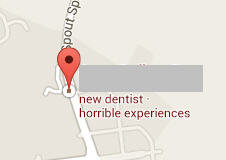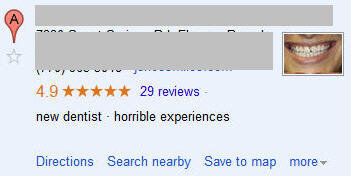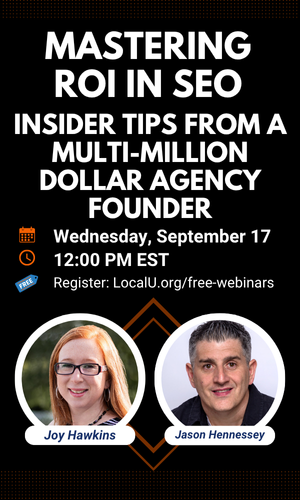OK so here are a couple cases I wanted to point out where the algo arbitrarily pulled out and associated sentiments that are not only NOT representative of the business but extremely damaging.
CASE #1
A family friendly florist in the "bible belt" that had the words
"sex toys" in her "People Talk About" snippets. These words are NOT ANYWHERE that I can find. Certainly not in any of her reviews.
Here is the thread at the Google forum.
In that thread someone said their competitor's names are in their snippets, so that's not cool either.
CASE #2
I'm in a private forum with a bunch of Dentists. This Dr's snippets, embedded in new maps and on his profile in classic maps say... (Note I don't have permission to share so obfuscated a bit)
new dentist ? horrible experiences
(Note: I don't have permission to share so obfuscated a bit)
REALLY BAD since those snippets are embedded right in the new Google Maps
 And here they are in list view in classic maps
And here they are in list view in classic maps
 Potentially VERY damaging to a small word-of-mouth practice!
Potentially VERY damaging to a small word-of-mouth practice!
About 8 reviews say things like "I'm so happy with my
new Dentist, Dr John Doe' so I get why the algo surfaced that, BUT it makes it sound like he's brand new and he has a mature practice.
horrible experiences - only shows up once in reviews and it's not AT ALL about him. The review says: (Again edited slightly to protect anonymity)
"I first want to start out by saying thank you to Dr John Doe. When I first called and spoke the office I was petrified. Like most people I didn't like the word dentist. I would rather lick asphalt than have to relive the
horrible experiences through out my life that I had with dentists."
So the ONLY place anywhere that had the phrase
horrible experiences was in that single review AND it was not about him, it was about previous Dentist's she'd been to.
I told him to contact support to see if they could/would fix it.
Support said: "The engineers have reached back out and stated that at this time, they cannot remove terms for reasons such as being unclear or negative. These terms are a piece of our search results and we try to avoid editing or creating bias in what we show."
The Dr said: "Seriously....this is so messed up. I mean, isn't that almost defamation put that under my name when no-one even used those exact terms literally, and especially not in regards to me?"
The Dentists in this thread (not my forum, somewhere else) are pretty up in arms about this.
I'm not sure what department is in charge of this feature, but it's not controlled by the department I work with at Google and it seems they are not willing to fix these issues, but we are trying to get them to.
I'm sure to some degree it's like reviews and Google does not have the time or interest in playing judge and jury to investigate thousands of complaints to see if the comment is valid or not.
This type of automation can have serious consequences for a business.
I wonder if whoever is in the ivory tower and making the decisions in that department ever thought "What if that was my practice and my patients were telling me that my listing on Google said 'horrible experience'. How much damage that could do to my small practice? Worse yet, I wonder how many potential new patients would simply surf away and never call!"
Sadly I don't think the people that sit in ivory towers know how to think like that!







